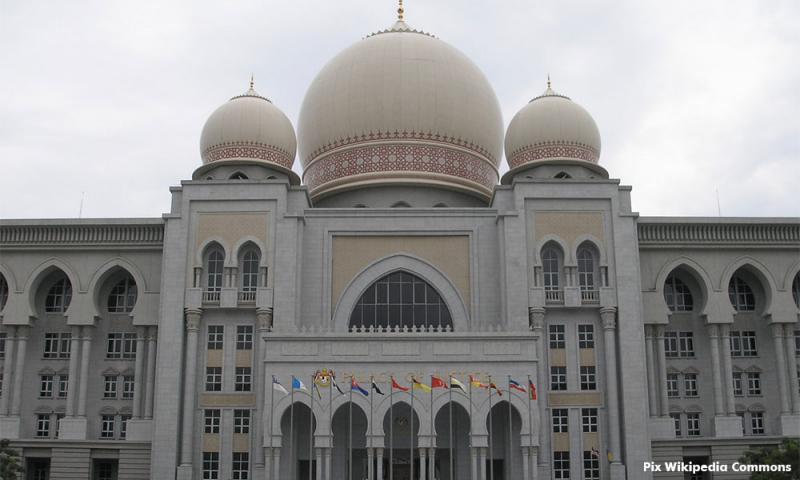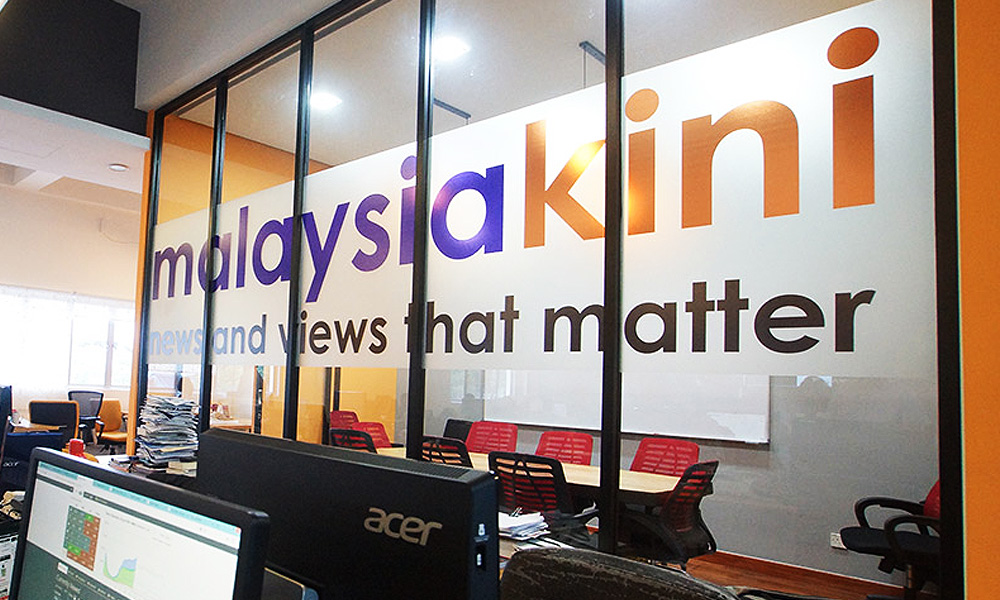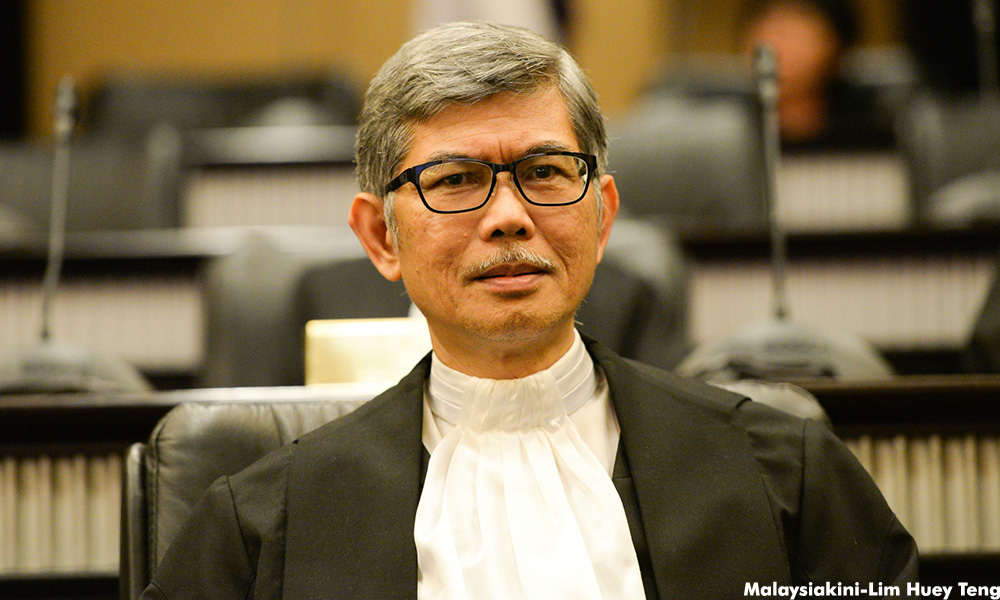Everyone, even the poor and middle class, must be encouraged to go to court to claim their rights, but in recent times the imposition of HIGH COST by Courts deters many, save the rich, from the Courts.
Before, even at the Court of Appeal, cost awarded was a more reasonable RM5,000, and even lesser when it is a issue is a matter of public interest, or if one of the parties was poorer - Certainly, courts should encourage the right to a fair trial, including the right to 2 appeals. Cases at the Federal Court really should preferably not even have an award of Cost, as access only granted if there some issues.
Recently, in the defamation suit of Anwar, Khairy fails to set aside Anwar' suit at the Court of Appeal, and Khairy was ordered to pay cost of 50,000.
Damages and compensation are ordered for the wrongful action/etc BUT COST IS DIFFERENT, it is the additional payment imposed by court..
In the Khairy case, Khairy had already been ordered to pay Anwar RM150,000 for defamation. Justly, when he exercised his right of 1st appeal, he should not have been penalized with a massive cost of RM50,000 more. Would this not deter him from appealing to the Federal, a right he has to appeal. Would he then be imposed with COST of RM100,000, if he appeals to the Federal Court - meaning at the end of the day, for exercising his RIGHT TO A FAIR TRIAL, WHICH INCLUDES THE RIGHT TO 2 APPEALS, he may end up paying RM150,000 in damages and RM50,000(plus maybe after Federal Court plus another 50k or 100k)
Well, Anwar and Khairy may be RICH enough and such cost awards may not be too difficult to settle. [But, the IMPACT on the other ordinary persons in Malaysia, such HIGH cost awards may be a DETERRENT to fight matters in Court - so, injustice and rights violation victims simply opt to suffer, too fearful to take and fight matters in court. The FEAR of high cost, may also mean them 'settling' to claims of rights violators - JUSTICE THEN IS NO LONGER AVAILABLE in the Courts - is that what the Malaysian Judiciary wants?
Take another case, the defamation suit of Raub Australian Gold Mining's (RAGM) against small 'not rich' alternative news portal Malaysiakini. Malaysiakini won at the High Court, but at the Court of Appeal, Malaysiakini lost was ordered to pay RM200,000 in damages and RM150,000 in costs.
Naturally, Malaysiakini appealed but the Federal Court dismissed the appeal, and ordered a further cost of RM200,000.
So, at the end of the RM200,000 in damages for the act of defamation, and a further RM350,000 as COST.
The problem with COST deterring poor clients making needed applications
In a recent case, that I was involved in, I experienced how this COST orders affected the fight of ordinary people against corporations. For every application in the High Court dismissed, cost of about RM5,000 is scary... Hence, even the need to add parties, or even commence other suits were much needed for success is SCARY ...more so, when a belief that the Courts may be on the side of the State...Here was individual kampung folks being sued by the logging contractors of a license holder who is the Pengurus Besar Yayasan Pahang, who even the was admitted by the other side was a party that could not be added as a party, as it was not a legal entity capable of suing or being sued. A logging licence reasonably cannot be granted to such a non-legal entity, and it follows that such a non-legal entity naturally cannot even appoint or enter into an agreement with any logging contractor or worker. Hence, the ordinary peoples' chances of winning was VERY HIGH, but problem arises if the fear of COST results in not wanting to file additional application, or even additional suits needed. [This, be my personal opinion].
COST is thus a deterrent to justice & is certainly discriminatory against the poorer Malaysians.
The JUDICIARY must remove this deterrent by maybe:-
# Stopping the awards of HIGH Cost - For Appeals to the Court of Appeal, and the Federal Court, COST should be limited to a token cost, not more than RM5,000.
# At the High Court or lower courts, the courts must stop awarding quantified cost for each and every inter-locutory application. The issue of cost, including quantification, should be done at the end of the suit/case at the High Court/Session Court/Magistrate Court. COST should also be limited per suit to a reasonable sum of maybe not more than RM5k, and this includes all applications in that 1 suit., and cost should never be demanded to be paid until the entire case, including appeal is done.
It must be appreciated that the Minimum Wage in Malaysia is RM1,100 - RM1,200, and the fact that many a Malaysian simply do not have much extra after spending whatever they earn for the daily/monthly living, and putting aside a little for old age savings. The ordinary person does not earn as high as Judges, MPs, Ministers or the 'super rich'.
COST and court fees should not be a DETERRENT to people seeking justice in court. The litigant, as it is have to already expend monies, effort and time to battle for justice in courts - they have to pay their lawyers, Commissioner of Oaths and court fees - This reality must be appreciated by the Judiciary, and even State, if the intention is to ensure the RIGHT TO FAIR TRIAL, including the right to 2 appeals to ALL.
In some countries, the have 'JUSTICE FUNDS' in place that provide monies to the poorer persons to ensure that they achieve equality/equity of sorts in their legal battles. Thailand has the Justice Fund Act 2015.
The Justice Fund was established with the objective of helping the poorest and most vulnerable with legal assistance in order to have access to equal justice.
The fund gives loans to low-income people to cover bail and legal costs. It provides financial support or expenses for legal aid, litigation, prosecution, legal execution and provides protection to person who is deprived of right and liberty.

KUALA LUMPUR: Rembau member of parliament Khairy Jamaluddin has failed to set aside the RM150,000 that he has to pay Datuk Seri Anwar Ibrahim for defaming the latter, 14 years ago.
This after the Court of Appeal chaired by Datuk Lee Swee Seng dismissed the Health Minister's appeal against the High Court's decision today.
Lee in her judgment said High Court judge Azizul Azmi Adnan did not err in making his decision as the defence of justification was not made out.
"This, therefore, does not warrant the appellate court's intervention," she said before dismissing the appeal with cost of RM50,000.
Anwar filed the defamation suit against Khairy in 2008 over the "homosexual insinuation" brought by Khairy who was the then Umno Youth deputy chief.
The words by Khairy were published on several online portals like Malaysiakini, which carried an article titled "Anwar and Kin No Threat".- New Straits Times, 7/2/2022


The Federal Court has dismissed Malaysiakini's appeal against a lower court decision that ruled in favour of Raub Australian Gold Mining's (RAGM) defamation suit.
Along with the ruling came an order for the news portal to pay RAGM an additional RM200,000 in costs, on top of the RM350,000 in costs and damages awarded by the Court of Appeal in 2018.
Malaysiakini will not be seeking public donations in view of the economic downturn due to Covid-19. The news portal will be using its legal defence fund - it had raised RM350,000 to pay RAGM in 2018.
The decision was a split 3-2 majority by the five-member panel which was chaired by Federal Court judge Vernon Ong Lam Kiat.
The majority judgment in favour of dismissing Malaysiakini’s appeal was read by fellow bench member Abdul Rahman Sebli. Other members of the bench on the majority side were Zaleha Yusof and Hasnah Mohammed Hashim.
The minority decision in favour of allowing Malaysiakini's appeal was read out by bench member Harmindar Singh Dhaliwal. Ong was part of the minority judgment.
Counsel Cyrus Das represented Malaysiakini while Cecil Abraham acted for RAGM.
Related report: Majority and minority judgments in Mkini's RAGM defamation case
In 2016, the High Court in Kuala Lumpur ruled in favour of Malaysiakini on grounds that the news organisation had succeeded in its defence of responsible journalism and reportage.
Reportage is a defence against defamation lawsuits, usually involving media organisations republishing unproven accusations about public figures so long as the reporting is unbiased and in the public interest.
The High Court also ruled that Malaysiakini had not acted in malice.
In 2018, the Court of Appeal overturned the decision, ruling that the articles in question were "reckless, accusatory and damaging in tone".
The Court of Appeal ordered the news portal to pay RM200,000 in damages and RM150,000 in costs. Today, the Federal Court imposed additional costs of RM200,000.
Abraham sought for the apex court to impose costs at RM250,000, while Das pleaded for costs to be set at RM30,000.

Malaysiakini editor-in-chief Steven Gan said the decision today was a huge blow for public interest journalism.
"We are disappointed by the decision. We were carrying out our duty as journalists in reporting the health concerns of the Bukit Koman villagers.
“In an earlier decision involving a lawsuit filed by the company against the villagers, this same court, in delivering victory to the villagers, said they have the right to express their concerns over the gold mining.
“However, in our case, we were found to have committed defamation for primarily reporting what they said," Gan said.
Malaysiakini CEO Premesh Chandran noted that today's split decision went into depth of the boundaries of law covering defamation and with the differing views between the majority and minority verdicts, it would serve as fertile ground for debate.
"We take heart that the minority judgment has noted legal changes among Commonwealth countries towards supporting the critical role the media plays in voicing public concerns.
"In these times of crisis, and with so many people facing extreme hardship, it's critical that the media speaks up and holds those in power to account. Hence, we will continue with our duty to report news and views that matter, without fear or favour, with accuracy and balance. Malaysians deserve no less.
"Given the dire situation in the country, we will not be asking for public donations. It's more important that families are kept afloat," Premesh said.
He expressed gratitude to Malaysiakini's legal team as well as friends and supporters who backed the news portal all the way.
Gan said that Malaysiakini will not be asking for public donation this time as it had raised RM270,000 beyond the RM500,000 fine that was imposed by the Federal Court for contempt earlier this year.
“Those who want to support us can do so by subscribing to Malaysiakini or pay for another person’s subscription,” he said.
Three years ago, Malaysiakini raised RM350,000 to cover the damages and costs awarded by the Court of Appeal.

During proceedings conducted via Zoom this morning, the Federal Court’s majority decision read out by Rahman agreed with the Court of Appeal finding that Malaysiakini failed to fulfil the Reynolds defence of responsible journalism by taking appropriate and reasonable steps to verify the truth and accuracy of the articles.
Rahman said there were many aspects of the articles and videos that were verifiable and which needed verification, but which the appellants did not bother to check for truth and accuracy.
The Court of Appeal then had ruled that, among others, Malaysiakini should have tried to seek expert verifications on the allegation involving the mining at Bukit Koman in Raub, Pahang.
During the Court of Appeal hearing, RAGM’s legal team submitted that Malaysiakini was obliged to independently seek a scientific determination of the truth of the allegation of pollution and health hazards, from experts such as the Health Ministry or the ministry dealing with the environment, among others.
“The appellants’ failed attempts to get clarification from a representative of the respondent (RAGM) in connection with the articles and videos are not a valid excuse in all the circumstances of the case to go ahead with the publication of the defamatory articles and videos.
“After all, the respondent had explained why it would not comment on the stories, and this was because of the pending judicial review application.
“But more importantly, it cannot be the philosophy behind Reynolds that if the claimant refuses to comment on the story, the journalist is thus given a free pass to publish the material in a way that is defamatory of the claimant.
“The burden remains with the journalist to verify the truth and accuracy of what is published,” Rahman said.
He also pointed out that the three-person majority bench today concurred with the Court of Appeal’s ruling that the defence of reportage should have first been pleaded in Malaysiakini’s statement of defence rather than raised during High Court submissions on the suit.
The defence of reportage is where media reporting is done neutrally, without adopting or endorsing the report, as long as both sides of the dispute have been fairly reported in a disinterested manner.
“We agree with the Court of Appeal. A journalist who relies on reportage as a defence parts company with the Reynolds defence of responsible journalism, a defence which allows him to put forward the defamatory material as true, but which the defence of reportage does not allow.
“For this reason, he cannot have it both ways. He must decide which it is to be, reportage or the Reynolds defence of responsible journalism,” Rahman said.
“In the absence of any amendment to their statement of defence, the appellants (Malaysiakini) should not have been allowed to travel outside the four corners of their pleaded defences, namely fair comment, the Reynolds defence of responsible journalism and freedom of expression,” he added.
Minority ruling: Urgency of story must be taken into account
However, a diametrically opposite view was taken by the apex court’s minority ruling today read out by Harmindar, where he said that Malaysiakini had practised responsible journalism by seeking a response from parties in the matter, including RAGM, but its representative declined to comment.
He noted that the news portal had already sought response from not only residents of Bukit Koman but also from then minister Ng Yen Yen as well as then State Local Government, Environment, and Health Committee chairperson Hoh Khai Mun.
“Considered as a whole, the only fair and reasonable conclusion is that the impugned Articles and Videos were an accurate, balanced, and neutral account of the dispute,” Harmindar said.
“Secondly, if any verification exercise is required to establish that the publisher or journalist has acted responsibly, it should not be burdensome or time-consuming such that the urgency of the story is lost.
“As news is a perishable commodity, as recognised in Reynolds, the urgency of a story is a factor to be taken into account, especially in respect of an ongoing story of public interest. It would unreasonable to expect a newspaper to undertake a verification exercise with independent experts or engage its own experts before publishing a developing story of daily interest.
“In the present case, the whole story about the fears arising from the plaintiff’s gold mining activities was already in the public consciousness. The evidence disclosed that since 1996, there were at least 26 news articles from various news media which reported the use of cyanide by the plaintiff.
“So, to now impose a burden on the media to engage independent experts prior to publication would not just be an onerous undertaking but also impractical as the function of the media is to report the news as it unfolds,” he said.
Harmindar also said the minority decision disagreed with the Court of Appeal’s finding that Malaysiakini should have pleaded the defence of reportage separately from the Reynolds defence of responsible journalism.
He said this is because reportage is not distinct and separate from responsible journalism or qualified privilege generally.
“As a parting rejoinder, it must be said, and this is beyond dispute, that
the press and the journalists play a crucial role in reporting matters of
public interest and matters of serious public concern. In its role as a
watchdog for the people, the awareness created by such media reports will by
and large lead to greater protection of society as a whole. In carrying out
this duty, the press may at times get the facts wrong.
“However, in matters of public interest, so long as the press hold a reasonable belief that the publication is in the public interest or that the publication is a fair, accurate and impartial account of a dispute, the press and journalists are entitled to the protection of the law,” Harmindar said. - Malaysiakini, 2/7/2021
Govt establishes Justice Fund to reduce inequality
 views
67
views
67
BANGKOK, 30th December 2018, (NNT) - The government has a policy to address inequality and increase opportunities for disadvantaged people by establishing a justice fund in accordance with the Justice Fund Act 2015.
The Justice Fund was established with the objective of helping the poorest and most vulnerable with legal assistance in order to have access to equal justice.
The fund gives loans to low-income people to cover bail and legal costs. It provides financial support or expenses for legal aid, litigation, prosecution, legal execution and provides protection to person who is deprived of right and liberty.-National News Bureau of Thailand





No comments:
Post a Comment